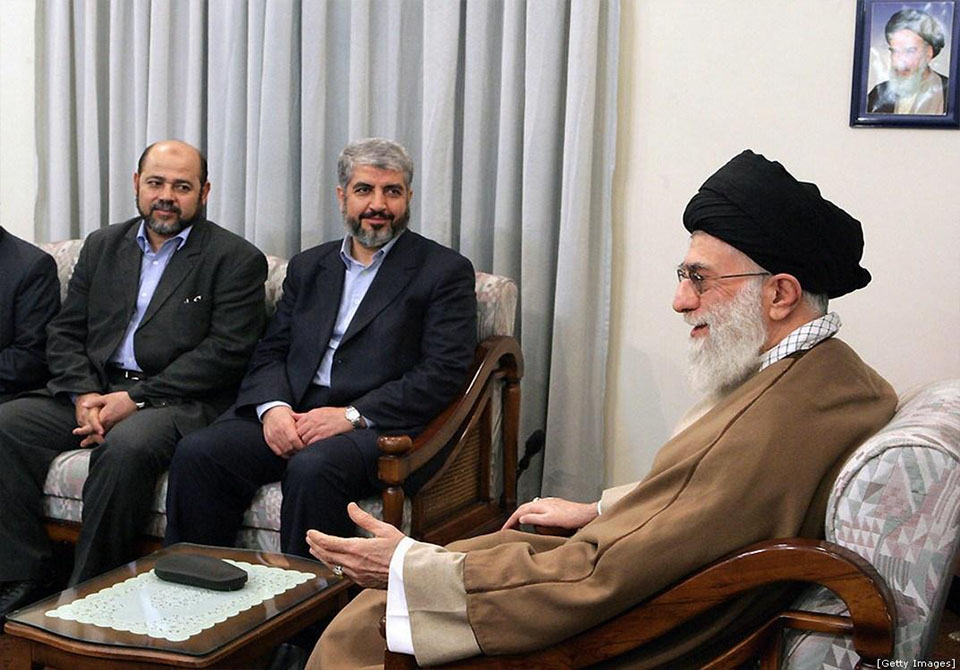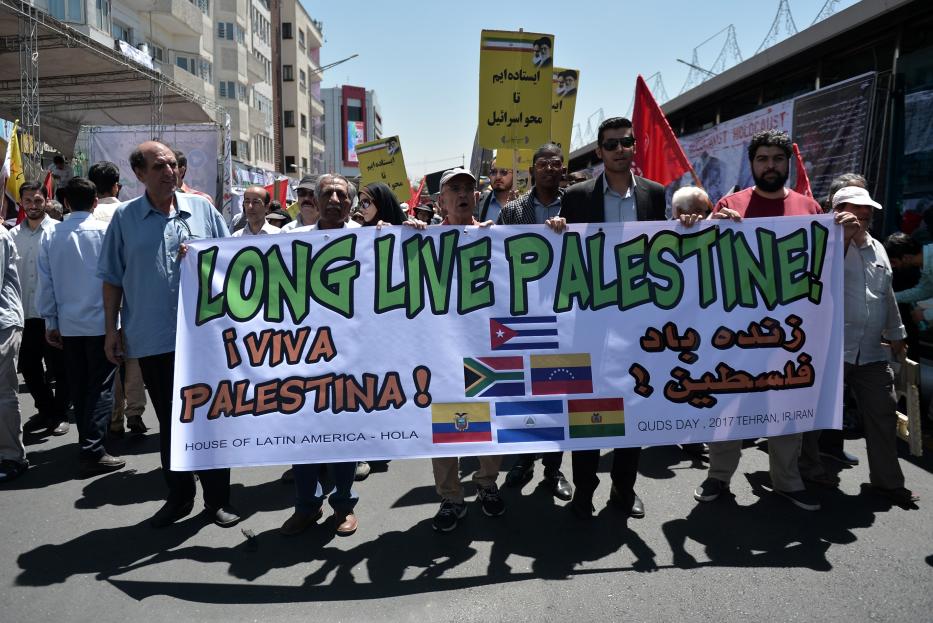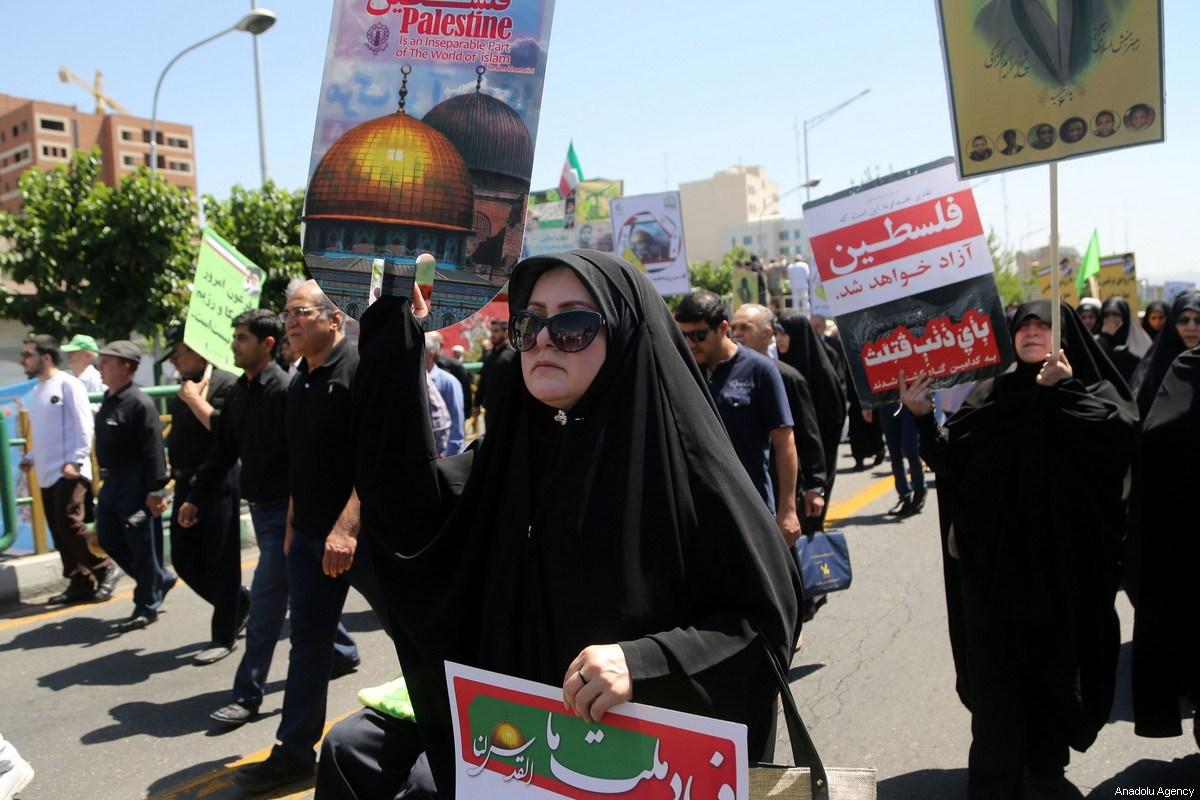The Hamas-Iran alliance remains and expands

Iranian-Palestinian relations – specifically with the resistance factions led by Hamas and Islamic Jihad – are gradually growing and developing in what seems to be an attempt to make up for the coldness between them during the Syrian crisis
This development manifested itself on two levels over the last few weeks: verbal and practical. Both parties even speak using the same discourse, using common goals and aspirations they have agreed upon. This gives Iranian influence an additional boost in the tensest area of the Middle East, which casts its shadow over the various parties – both positively and negatively – according to its positions and objectives.
Warm statements
Hamas’ representative in Iranian capital Tehran, Khalid Al-Qadoumi, stated in November that his movement “has a special relationship with Tehran, as we have a common enemy in Israel”. He explained:
"Our relationship with Tehran has witnessed several phases, as our strategy with Tehran is based on confronting Israel, our common enemy. Iran has not stopped supporting the Palestinian cause, most recently the Great Return Marches in Gaza, and the two sides have reached a strategic partnership in this regard."
Several other Hamas members have echoed Al-Qadoumi’s statement. Head of the Hamas Political Bureau, Ismail Haniyeh, stressed in a letter to Iran’s Supreme Leader, Ali Khamenei, this month that “the Palestinian people applaud Iran’s positions in supporting the resistance with all forms of aid”. Hamas Political Bureau member, Moussa Abo Marzouk, said in March last year that: “Our relationship with Iran is excellent because it offers the movement a lot, which is something we are missing from others.”
Meanwhile Hamas’ leader in Gaza, Yahya Sinwar, in May mentioned the strength of the movement’s relations with the Iranian Revolutionary Guard and its leader, Qasim Soleimani, given that Iran has supported the movement by every means possible.
Iran has also expressed such warm sentiments. Commander-in-Chief of the Iranian army, Abdolrahim Mousavi, and commander of the Aerospace Force of the Islamic Revolutionary Guard, Amir Ali Hajizadeh, both said in a statement in November that Hamas’ victory in Gaza during the escalation that month forced Israel to agree to a ceasefire, adding that the besieged Gaza Strip had defeated Israel. Hussein Sheikholeslam, an advisor to the Iranian Foreign Ministry, stated that Hamas had managed to successfully lead its people and achieve victory against Israel.

Iranians take to the streets to mark Al Quds day, an annual event which is marked globally and calls for the support of Palestinians against the apartheid state of Israel
As for Iran’s Chief of Police, Hossein Ashtari, he announced this month his willingness to train the Palestinian resistance, pass on experience and organise training courses for the resistance forces. Senior advisor to the Supreme Leader, Ali Akbar Velayati, also stated this month that Hamas is relying on Iran to back the resistance.
In July, a senior officer in the Iranian Revolutionary Guard, Gholamhossein Gheybparvar, praised the Palestinian resistance during his participation – via video link – in a conference between Gaza’s Palestinian factions and Tehran. Hamas stressed Iran’s support for the Palestinian cause and in confronting the so-called “Deal of the Century”.
It is difficult to say that these warm statements exchanged between Gaza and Tehran were made solely for the purposes of the media and political cordialities. Instead, they seem to express an alliance, common interests and a strategic decision by both sides that the time has come to turn a new page on their past misunderstanding, which lasted from 2012 to 2017 due to their respective positions on the Syrian civil war.
Practical support
Tehran has become a common destination for Hamas visits recently. Top-level officials in Iran greeted Hamas leaders and protocol pictures were taken, reminiscent of those taken during the golden age of the alliance between the two sides from 2006 to 2011.
The most recent Hamas visit to Tehran was made by a Hamas parliamentary delegation in December 2018, led by Mahmoud Al-Zahhar, Chairman of the Political Committee of the Palestinian Legislative Council (PLC) and a member of the Hamas Political Bureau. He, alongside a number of other Hamas leaders, is leading a trend in which Hamas is demanding the restoration of relations with Iran.
In October 2017, deputy head of the Hamas Political Bureau, Saleh Al-Aruri, visited Tehran and was welcomed by the Iranian leadership. The latter had announced their willingness to completely normalise relations with Hamas and restore them to their former level. In August of that year the Hamas leadership, headed by Izzat Al-Rishq – head of the Hamas’ Arab and Islamic Relations Bureau – had also visited the Iranian capital to attend President Hassan Rouhani’s inauguration ceremony.
This month Haniyeh was also scheduled to visit Tehran, but his plans were hampered by the closure of the Rafah border crossing on 10 January, itself caused by the decision of the Palestinian Authority (PA) to pull its staff from the crossing and Egypt’s refusal to reopen it. This visit was meant to crown Hamas’ return to the Iranian axis, despite the fact that the movement distances itself from the titles of such regional axes. Reality, however, is telling of this shift.
Meanwhile, Iran has made clear efforts to support Hamas in its actions on the ground. This was manifested in the statement of Iranian deputy UN ambassador, Es’haq Al-e Habib, in December, during which he expressed Iran’s rejection of the US draft bill to condemn Hamas at the UN.
In November, Iran decided to financially support the families of those martyred and wounded in the Great March of Return in the Gaza Strip. In June, Iran gave a $500 grant to the families of each individual martyred in the March, as well as $250 to the each of the wounded. The number of martyrs reached 200 and over 20,000 were wounded since the protests began in March 2018.
In May, an Iranian charity in Gaza offered iftar (an evening meal eaten to break fast during Ramadan) to thousands of Palestinians, providing 300,000 meals throughout the month of Ramadan.
As for financial and military support, there is no accurate information available given the sensitivity of the matter. There are only estimates of these figures among Israeli circles, with the Israeli Chief of General Staff, Gadi Eizenkot, claiming this month that Iran is supporting Hamas and the other Palestinian factions with $100 million a year. This prompted Israeli Prime Minister, Benjamin Netanyahu, to claim that half of the Palestinians are under Iranian influence.
Common interests
This not much left to say in terms of analysing and evaluating the quickening restoration of relations between Hamas and Iran. This raises a number of questions regarding the reasons behind these initiatives and their expected outcomes and consequences for both sides.
Hamas is suffering from a suffocating financial crisis which, according to some estimates, may even have reached an unprecedented level. This is due to several reasons: Egypt’s closure of the trade tunnels on the border between Gaza and the Sinai Peninsula, which provided Hamas with a considerable source of money; Iran stopping its support for Hamas after the decline in their relationship as a result of the Syrian civil war; and Hamas handing over the management of Gaza’s border crossings to the PA, which had previously contributed to serving Gaza’s financial needs.
This does not mean that Hamas’ return to relations with Iran is only based on financial need, despite the importance of this consideration. Rather, the movement’s wider political approach and strategic vision has perhaps pushed it to reconsider its past position on regional developments, specifically since the Arab Spring broke out in 2011.

Iranians march towards Tehran University during International Al-Quds Day protest in Tehran, Iran on 8 June, 2018 [Fatemeh Bahrami/Anadolu Agency]
Hamas did not hide its disappointment with the official positions of Arab states, which do not offer Hamas a tenth of what Iran provides neither in terms of funds nor weapons. Despite this, the movement is not spared the crisis taking place in these Arab capitals, especially in the Gulf states.
While the Foreign Affairs Minister of the United Arab Emirates (UAE), Anwar Gargash, in November accused Hamas of becoming a tool in Iran’s regional policy, Saudi Arabia took a more severe position. During the terms of the two former Saudi foreign ministers, Saud Al-Faisal and Adel Jubeir, both were hostile towards Hamas. They also explicitly stated that Hamas’ relationship with the Arab countries is dependent on it distancing itself from Iran, without providing a financial or military alternative. Hamas, therefore, did not pay much attention to these overtures.
The PA joined the circle of those opposed to Hamas’ restoration of relations with Iran, claiming that the Palestinian arena would be open to Iranian interventions. This resulted in harsh statements being exchanged between Tehran and Ramallah.
Meanwhile, Iran believes that Hamas returning to its embrace achieves its interests, especially given the decline in its reputation and image in the Arab world in recent years. This came after accusations of Iranian involvement in the murder of hundreds of thousands of Arabs in Syria, Iraq and Yemen and Iran’s explicit desire to impose its control in those countries. Iran also did not hide its wish to continue spreading its influence in the neighbouring capitals Baghdad, Damascus, Beirut, and Sanaa.
Iran is aware that Hamas has considerable popular Arab support, making it a golden ticket it could utilise to “whitewash” Iran’s dark image in the region. Iran believes that getting closer to Hamas would make up for its mistakes and sins in the eyes of the Arab public, as Hamas is considered the spearhead of the Palestinian resistance and has won the confidence and trust of the masses.
Furthermore, Iran is seeking to pull Hamas back under its wing in order to form a military front in the confrontation against Israel. This front consists of Tehran, Damascus, Beirut and Gaza as part of its strategy to “unify the fronts”. This has been welcomed and blessed by Hamas on several occasions.
Neither Hamas nor Iran has clarified what this front actually is, who would defend who, or if Hamas is obligated to respond to Israeli attacks against Lebanon, Iran or Syria. We do not know if these countries are obligated, as a group or individually, to respond to any Israeli attack against Gaza. All of these issues, thus far, remain unclear.
Source: Middle East Monitor

WRITE YOUR COMMENT